Digital Poster
Body Analysis
ISMRM & ISMRT Annual Meeting & Exhibition • 10-15 May 2025 • Honolulu, Hawai'i

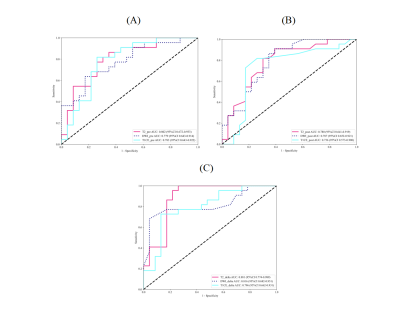 |
Computer Number: 1
2868. MRI
delta Radiomics model based pre and post-treatment accurately
predict the treatment response of Lung Cancer to concurrent
chemoradiotherapy
Y. Chen, C. Xie, Q. Li
Sun Yat-sen University Cancer Center, guangzhou, China
Impact: MRI-based radiomic predictive models accurately
predict the post treatment response of locally advanced lung
cancer to chemoradiotherapy, providing a novel assessment
method that mitigates radiation exposure risks.
|
|
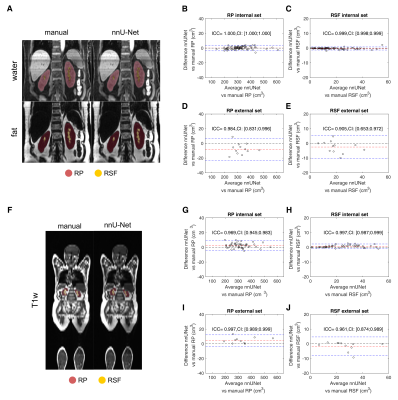 |
Computer Number: 2
2869. Comparison
of whole-body and abdominal MRI for the estimation of renal
sinus fat in healthy volunteers and people with type 1 and type
2 diabetes
F. Michelotti, R. Koshiba, K. Arens, C. Möser, Y.
Kupriyanova, M. Roden, R. Wagner, V. Schrauwen-Hinderling
German Diabetes Center, Leibniz Center for Diabetes Research , Düsseldorf, Germany
Impact: Whole-body MRI with interslice-gaps can be used
to accurately estimate renal sinus fat in people with type 2
diabetes, however, corrections of values based on more
detailed, high-resolution MRI measurements are necessary.
|
|
|
Computer Number:
2870. WITHDRAWN |
||
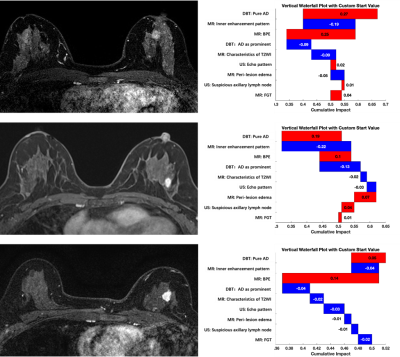 |
Computer Number: 3
2871. Multimodal
Diagnosis of Breast Lesions Presenting as Architectural
Distortion on DBT by Integrating with Ultrasound and MRI
Features
J. Zhou, Y. Zhang, Y-L Liu, X. Chen, J-H Chen, M. Wang, M-Y
Su
The First Affiliated Hospital of Wenzhou Medical University, Wenzhou, China
Impact: Diagnosis of lesions presenting as architectural
distortion on Digital Breast Tomosynthesis (DBT) is
difficult by all breast imaging modalities, and the
performance can be improved with ML models developed using
the combined multimodal features of DBT, US and MRI.
|
|
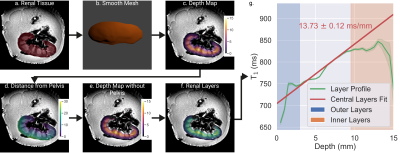 |
Computer Number: 4
2872. Assessing
3DQLayers for Quantitative Cortico-Medullary Gradient
Measurements using Ex-Vivo Renal Tissue
A. Daniel, S. Francis
University of Nottingham, Nottingham, United Kingdom
Impact: This work demonstrates the application of
‘3DQLayers’, software to study depth-dependent renal
cortico-medullary gradients in quantitative MRI measures.
3DQLayers is demonstrated in high resolution ex-vivo tissue
and shown to provide improvements over traditional
region-of-interest based analysis methods.
|
|
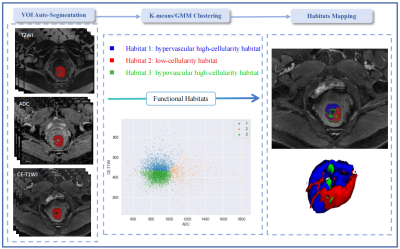 |
Computer Number: 5
2873. Multiparametric
MRI Habitat Models Improve Non-Invasive Risk Stratification and
Prognosis Prediction in Endometrial Carcinoma
Y. Wu, S. Ju
Nanjing University of Information Science and Technology, Nanjing, China
Impact: MRI-based habitat analysis and imaging provides
a non-invasive method for predicting EC risk levels and
prognosis at the celluar level, aiding treatment
decision-making.
|
|
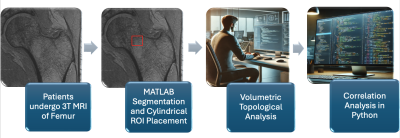 |
Computer Number: 6
2874. Improved
3-T MRI Proximal Femur Microarchitecture Parameters Correlate
with Higher DEXA Bone Mineral Density T-Scores
A. Clayburn, X. Zhang, A. Monga, S. Honig, C. Rajapakse, P.
Saha, G. Chang
New York University Grossman School of Medicine, New York, United States
Impact: This study suggests that MRI metrics of bone
microarchitecture could complement DEXA in osteoporosis
assessment, together offering a more comprehensive tool to
improve fracture risk prediction and enhance
patient-specific treatment strategies for osteoporosis.
|
|
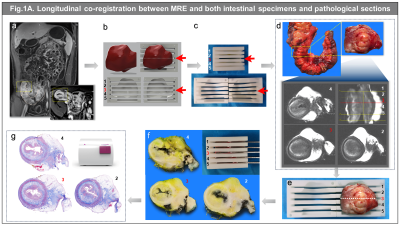 |
Computer Number: 7
2875. Intestinal
sub-regionalization improves the diagnostic accuracy of MR
enterography for fibrosis in ileal Crohn’s disease
L. Wu, J. Lin, R. Zhang, Y. Wang, X. Shen, X. Wang, Q.
Zheng, X. Li
The First Affiliated Hospital, Sun Yat-Sen University, Guangzhou, China
Impact: In CD patients, there is a notable fibrosis
heterogeneity in the gut. This heterogeneity is pivotal in
affecting diagnostic accuracy of fibrosis. Consequently, it
is imperative to adopt a sub-regional diagnostic approach to
ensure precision in medical assessment and treatment.
|
|
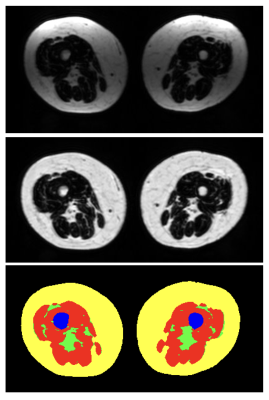 |
Computer Number: 8
2876. Thigh
Fat to Muscle Ratio on MRI is Related to Alzheimer’s Disease
Neurodegeneration in Midlife Obesity
M. Naghashzadeh, P. Commean, M. Dolatshahi, S. Hosseinzadeh
Kasani, S. Mohammadi, C. Nguyen, L. Lloyd, N. Hantler, A.
McBee-Kemper, F. Rahmani, J. Ippolito, J. Morris, C. Sirlin,
B. Mittendorfer, T. Benzinger, H. An, C. Raji
Washington University in St. Louis, St. Louis, United States
Impact: This study demonstrates that thigh FMR may serve
as a predictive risk indicator for AD, enabling early
identification of individuals at risk. This insight
encourages targeted interventions to modify FMR, potentially
delaying neurodegeneration and improving cognitive outcomes.
|
|
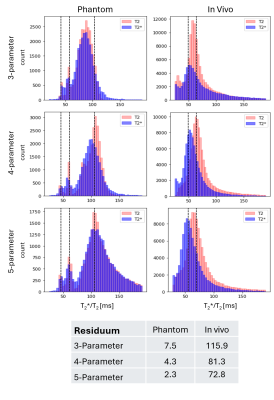 |
Computer Number: 9
2877. Comparison
and Optimization of Fitting Methods for the Quantification of
Multi-Parametric Relaxometric GE-SE EPIK Data
F. Küppers, O. Al Omari, N. J. Shah
Forschungszentrum Jülich, Jülich, Germany
Impact: Individual free pulse correction parameters for
subsequent refocusing pulses combined with noise
consideration in the form of Rician model fitting
significantly improve simultaneous T2 and
T2*
quantification based on GE-SE EPIK data in terms of better
precision and reduced residuums.
|
|
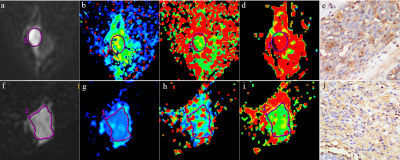 |
Computer Number: 10
2878. Correlation
Study between IVIM-DWI Quantitative Parameters and HIF-1α
Expression in Breast Cancer
S. lv, W. Wang, Z. Sun
Affiliated Hospital of Jining Medical University, Jining, China
Impact: We initially assessed the oxygenation level of
breast cancer utilizing functional MRI. IVIM-DWI may be used
to predict the level of HIF-1α expression of breast cancer
non-invasively, which is helpful in guiding clinical
decision-making and prognosis assessment.
|
|
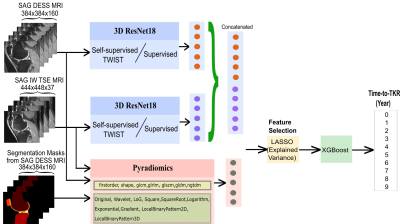 |
Computer Number: 11
2879. Predicting
Time-to-Total Knee Replacement: Deep Learning vs Radiomics
O. Cigdem, E. Montin, S. Chen, C. Zhang, K. Cho, R.
Lattanzi, C. Deniz
New York University Grossman School of Medicine, New York, United States
Impact: This study advances predictive models for
estimating time-to-TKR, aiming to support clinicians in
decision-making for knee osteoarthritis management. Accurate
prediction models can help patients and healthcare providers
make informed treatment decisions.
|
|
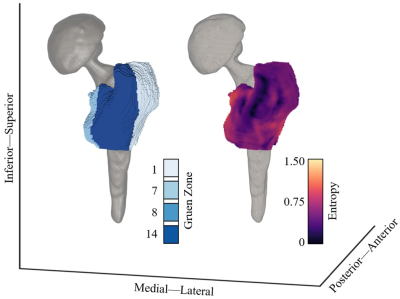 |
Computer Number: 12
2880. A
Longitudinal Analysis of MRI-Based Radiomics of Trabecular Bone
Surrounding Total Hip Arthroplasty
J. Consolini, E. Koretsky, M. Koff, H. Potter
Hospital for Special Surgery, New York, United States
Impact: Image texture analysis may provide a
quantitative measurement of trabecular bone abnormalities in
asymptomatic THA patients, indicating an individual’s risk
of post-surgical induced osteoporosis.
|
|
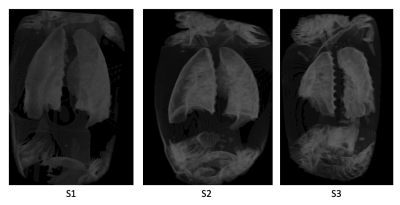 |
Computer Number: 13
2881. Free-breathing
3D cine lung imaging on low field MRI
C. Valle, J. Retamal, R. Salas, M. Andia, C. Besa
Millennium Institute for Intelligent Healthcare Engineering (iHealth), Santiago, Chile
Impact: Low-field 0.55T MRI enables functional lung
evaluation without ionizing radiation, providing a safer
alternative to traditional CT scans. This approach might
improve the assessment of lung pathologies, offering
enhanced diagnostic and monitoring capabilities,
particularly for functional lung imaging.
|
|
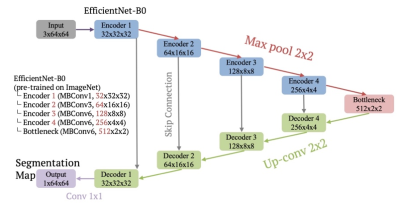 |
Computer Number: 14
2882. EfficientNet-B0
U-Net Model for Improved Specificity Cerebral Microbleed
Detection on QSM MRI
P-Y Lin, S. Iqbal, Y. Wen, R. Bhadelia, K. Tucker, S. Soman
Beth Israel Deaconess Medical Center, Harvard Medical School, Boston, United States
Impact: This model offers a sensitive, but highly
specific automated CMB detection method, well suited to
augment human readers for the multiple clinical instances
requiring careful CMB biomarker assessment. Its robust
performance enables large-scale CMB studies, advancing
neurovascular diagnostics and research.
|
|
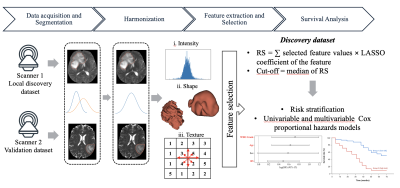 |
Computer Number: 15
2883. Radiomic
Score as a Noninvasive Predictor of Overall Survival in Gliomas:
A Multicenter Study
E. Sümer-Arpak, A. Ersen Danyeli, M. N. Pamir, K. Özduman,
A. Dinçer, E. Ozturk-Isik
Boğaziçi University, İstanbul, Turkey
Impact: Risk stratification in gliomas based on RS could
help identify high-risk patients, who may benefit from more
aggressive treatment and closer follow-up, enabling
personalized approach to care. The RS was established on
preoperative T2w-MRI and stably predicts the glioma OS.
|
The International Society for Magnetic Resonance in Medicine is accredited by the Accreditation Council for Continuing Medical Education to provide continuing medical education for physicians.